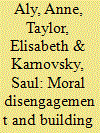| Srl | Item |
| 1 |
ID:
193286


|
|
|
|
|
| Summary/Abstract |
Ragging in Sri Lanka is a longstanding initiation ritual, similar to hazing and bullying. The severe harassment of new students by seniors has led to adverse consequences including depression, university dropouts and suicide. Although, a significant problem, research on ragging is scarce. This research aimed to explore how staff and work-affiliated individuals at Jaffna University resonate around the phenomenon of ragging. Seven focus group discussions and eleven semi-structured interviews were conducted. Foucauldian Discourse Analysis and Bandura’s Moral Disengagement theory were used to interpret the data. Three main discourses reflected the context: ragging as normal and necessary, insecurity and fear of reprisal, and voices of resistance. Participants often felt unsupported and therefore adapted their moral compasses to survive in this insecure environment. These findings demonstrate a fragmented approach to ragging that not only diminished any efforts towards elimination but affected how staff were forced to adjust their behavior to work in this environment. To address ragging, there is a need to adhere to a consistent strategy focusing on increasing awareness and supporting staff by holding accountable those at all levels of the administrative hierarchy in promoting a safe working environment for all.
|
|
|
|
|
|
|
|
|
|
|
|
|
|
|
|
| 2 |
ID:
132178


|
|
|
|
|
| Publication |
2014.
|
| Summary/Abstract |
This article reports on the development of an education intervention, the Beyond Bali Education Resource funded by the Australian Governments' Building Community Resilience Grants of the Federal Attorney General's Department, that applies a conceptual framework grounded in moral disengagement theory. Beyond Bali is a five module program for schools that is specifically designed to build social cognitive resilience to violent extremism by engaging self-sanctions and preparing students to challenge the influence of violent extremism that can lead to moral disengagement. The theory of moral disengagement has been applied to the study of radicalization to violent extremism to explain how individuals can cognitively reconstruct the moral value of violence and carry out inhumane acts. The mechanisms of moral disengagement through which individuals justify violence, dehumanize victims, disregard the harmful consequences of violence and absolve themselves of blame have been used in the construction of violent extremist narratives. However, they have not been applied to the development of intervention strategies that aim to counter the radicalizing influences of violent extremist narratives.
|
|
|
|
|
|
|
|
|
|
|
|
|
|
|
|